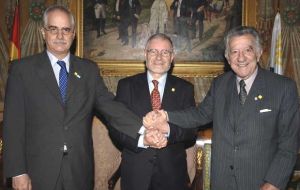MercoPress. South Atlantic News Agency
Uruguay/Argentina pulp mills dispute: waiting for Oct 28
 Spain's facilitating efforts have been rewarded so far by handshakes
Spain's facilitating efforts have been rewarded so far by handshakes Uruguayan and Argentine delegates on Saturday held a new round of talks in New York sponsored by the Spanish Crown in an effort to find a way out to the dispute over the construction of pulp mills along the river Uruguay jointly managed by the neighboring countries.
Uruguay was represented by Foreign Affairs minister Reinaldo Gargano, presidential advisor Gonzalo Fernandez and Argentina by Foreign Affairs minister Jorge Taiana and cabinet chief Alberto Fernandez with Spanish ambassador in the United Nations Jose Antonio Yañez-Barnuevo acting as "facilitator" of the three hours discussions. Spanish Foreign Affairs minister Miguel Angel Moratinos was also present. "It's been another step in the path to direct dialogue", said Ambassador Yañez-Barnuevo who added that he was "hopeful and encouraged to continue with the talks". "There are still some differences which we must find the way to address", he underlined during a brief press conference following the meeting. The two neighboring countries are confronted over the construction of a giant pulp mill in the river Uruguay, which Argentina objects on environmental grounds and administrative reasons alleging she was not properly informed about the investment as a 1975 accord on the joint management of the waterway demands. "We still have some going to complete", said the Spanish diplomat which is trying to facilitate a way out for the three year long dispute which has soured bilateral relations at official level plus the emergence of pickets blocking access to bridges leading to Uruguay causing considerable damage to the country's economy and over which the Argentine government seems to have lost all influence. Argentina would have liked the 1.5 billion US dollars investment relocated, as demanded by the picketers, but earlier this week Argentine President Nestor Kirchner admitted the Botnia-Orion plant was "a fact, since it's ready to begin production". His remarks infuriated picketers who called him a "traitor". Pickets organizations all along have claimed that the Kirchner administration has been "soft" with Uruguay and has been more interested in looking for a political solution to the dispute. Uruguay's policy has been no negotiations until the end to the pickets blocking the bridges, but accepted the dialogue "facilitating" efforts of the Spanish Crown based on the Madrid Declaration of a few months ago. Even if willing to concede and reach an agreement President Kirchner is conditioned by the October 28 presidential election that should enthrone her wife Senator Cristina Fernandez Kirchner as the first elected woman president of Argentina. Besides an air of resignation the message has been that Argentina will wait for the ruling of the International Court of The Hague where the case, following a demand from the Kirchner administration is under consideration, specifically violations of the 1975 agreement. "The solution will come from The Hague, it's hard to see it coming from the current negotiations with Spanish mediation", said Alberto Fernandez, the Argentine Executive spokesperson for unsavory announcements and sarcastic comments. The Uruguayan contribution has been to delay the official inauguration of the Finnish Botnia pulp mill until all security and safety measures have been double checked. During trials there was an escape of toxic gases and some water pools showed cracks. However the Argentine pickets' organizations announced that this Sunday they will cut highway 14, a crucial link between eastern and northern Argentina with Buenos Aires, and have threatened to take their claims to Cristina Fernandez campaign trail. According to the Argentine press President Kirchner, currently in New York, phoned Governor Jorge Busti, the province where the pickets have originated, to invite him for an emergency meeting next Monday in Buenos Aires to discuss the pulp mill conflict strategy. Kirchner this week addressed the UN General Assembly and is acting as consort of his candidate wife during her high exposure round of speeches and contacts with business, banks, lobbies and other organizations in New York. Outgoing Governor Busti is expected to travel with his elected successor and the mayor of Gualeguaychu, the city on the River Uruguay which has organized the pickets and protests. Busti described the pickets decision to interrupt traffic along the so called Mercosur highway as "unseasonable, excessive, non prudent and an attack on the presidential investiture", which he added "could provoke violence among Argentines". The governor recalled that President Kirchner had already managed to have a second pulp mill planned to be constructed in the same area, relocated to the River Plate




Top Comments
Disclaimer & comment rulesCommenting for this story is now closed.
If you have a Facebook account, become a fan and comment on our Facebook Page!